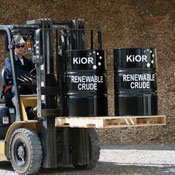Despite a strong show of support from state lawmakers last month, Houston-based startup KiOR is still a long way from breaking ground on the three biofuel facilities it has pledged to build in Mississippi. KiOR must secure a purchase agreement with an oil refinery before it can receive the $75 million loan the Mississippi Legislature authorized Aug. 27, and state and company officials say an agreement is still to come.
KiOR is "in discussions with a couple refineries," Mississippi Development Authority spokeswoman Sally Williams said.
The state's demand for a purchase agreement is a means of protecting the state's investment, Williams said.
"The major oil-refining companies out there know the technology inside and out," Williams said. "If they're willing to fund that contract, that shows that the experts in the industry are agreeing it's feasible."
Oil refineries could be forgiven for taking their time. KiOR claims to have developed an innovative means of processing biomass, like woodchips and agricultural waste, and turning it into a crude-oil substitute it calls "renewable crude." KiOR's technology relies on a decades-old process called pyrolysis--heating up biomass quickly in the presence of little oxygen. Pyrolysis breaks the compounds in wood down into a goop that looks like conventional petroleum but is more acidic and has higher oxygen content, making it degrade faster.
Pyrolysis oil is tricky to upgrade into gasoline, but that's what KiOR claims to do with its proprietary catalyst. KiOR says that its "renewable crude" has a much lower oxygen content and is less corrosive than other pyrolysis oils, making it essentially a "drop-in" fuel--one that can drop into the existing infrastructure for petroleum refining with no adjustment to equipment.
KiOR is not alone in this field: In January, the oil-refining technology company UOP received $25 million from the U.S. Department of Energy to build a demonstration plant in Hawaii that would turn biomass into transportation fuel by upgrading pyrolysis oil.
UOP is working with Ensyn--a Canadian company that is leading commercial pyrolysis--on the Hawaii plant, a collaboration that gives it an edge over KiOR, according to energy journalist Robert Rapier.
"With Ensyn's partnership with UOP to upgrade their pyrolysis oil--and over 20 years of pyrolysis oil experience under their belts--they are several steps ahead of KiOR in the path to commercialization," Rapier wrote in a Sept. 5 post on his blog for Consumer Energy Report, an energy-news website.
KiOR representatives and state officials have given media shifting estimates of the demand and productivity at each of the company's three planned facilities. Gov. Haley Barbour and KiOR CEO Fred Cannon said Aug. 26 that the company's plants would use 100 to 250 truckloads of wood per day and produce 800 to 1600 barrels of "renewable crude."
A company spokesman told the Jackson Free Press Sept. 23 that the company's first facility will use 50 truckloads of wood per day to produce between 700 and 800 barrels, while future plants would produce as much or more.
The company has repeatedly assured that its plants will use only "plantation trees," meaning it will rely on land already being cultivated for the state's paper and pulp industry.
Larry Jarrett, a forester in Pontotoc and Union counties, said the additional demand for tree thinnings would be welcome in the state's depressed timber industry. Pulp wood now sells for between $7 and $10 per ton.
Jarrett, a former president of the Mississippi Forestry Association, believes, however, that the demand from KiOR's three plants would outstrip the supply of pulp-grade wood, requiring some higher-quality timber to meet the company's production goals.
"Some of the industry people have told me that they see no way they can make it just on the trimmings," he said. "They've got to use some standing timber in order to support the size operation they're talking about doing."
Standard saw logs sell for two or three times as much as pulp trees, which would mean dramatic increases in KiOR's production costs. Jarrett worries that KiOR's demand for lower-quality trees may lead forest landowners to shorten rotations on their land. Instead of waiting 30 years before logging, landowners may harvest trees after only 10 years to do business with KiOR, he said.
"You've got an ecological desert when you have that (10-year rotation)," Jarrett said.



Comments
Use the comment form below to begin a discussion about this content.
comments powered by Disqus